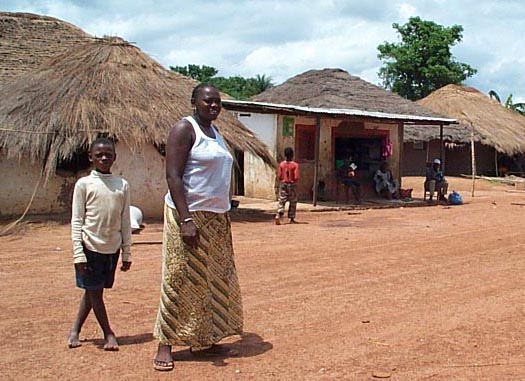
Aiken Forester found serving people in Central American Republic a life-changing experience
Aiken Forester found serving people in Central American Republic a life-changing experience
Blessed be the peacemakers
Aiken forester found serving people in small Central American nation a life-changing experience
Web posted Apr. 18 at 10:14 PM
Peace Corps information
By Karin Schill Staff Writer
Some villagers wondered if Steve Lenzo had done something wrong to be sentenced to their impoverished town for two long years.
It made no sense, they said, that an American awash in wealth and privilege would come to Honduras of free will.
Homes in the village had running water only for part of the year, and none had plumbing. There was one television, which ran on a car battery, and no electricity. Nobody spoke English.
Serving in the Peace Corps in Central America wasn't exactly a vacation, but it changed Mr. Lenzo's life forever.
"I think our country is better off the more people have that experience,'' said the Aiken father of three. "There's something very valuable about being able to immerse yourself in another language and culture. And at the same time that it's an incredible challenge, you really have a feeling of contributing.''
The 37-year-old Peace Corps program currently has 6,500 volunteers in 84 countries providing grass-root level educational and technical assistance. If President Clinton has his way, their numbers will be boosted to 10,000 by the year 2000 and the program's budget increased from $48 million to $270 million by fiscal 1999.
The goal of 10,000 volunteers was set by Congress in 1985. Over the years, Peace Corps officials have blamed inadequate funding and escalating program costs for the lagging recruitment.
The Clinton administration says the time has come to get the initiative back on track.
"In a world where we're more and more are affected by what happens beyond our borders, we have to work harder to overcome the divisions that undermine the integrity and quality of life around the world, as well as here at home,'' Mr. Clinton said in a January radio address. "Strengthening the Peace Corps, giving more Americans opportunities to serve in the humanities' cause, is both an opportunity and obligation we should seize in 1998.''
Whether Congress will allocate the money remains to be seen. The federal budget is tight, and any spending increases will be scrutinized carefully.
But the Peace Corps program, spearheaded by President Kennedy to promote peace and American ideals overseas, enjoys strong bipartisan support, with several members of Congress having served as volunteers.
One of Georgia's U.S. senators, Paul Coverdell, a Republican and a former Peace Corps director, is among those who want to see the program expand. In 1997, more than 15,000 people contacted the Peace Corps, a 40 percent increase from the number of inquiries in 1994, he told a House committee on March 18.
A forester by training, Mr. Lenzo arrived in Honduras in 1985 to teach villagers how to protect a recently installed communal water system from pollution. Clear-cutting near watersheds and cattle grazing often contaminated the springs, and it was Mr. Lenzo's job to help educate the Hondurans about the problem.
What they taught him in return, he said, was invaluable.
"Here was a community that was much poorer than any community in the United States, and yet the people there led really satisfying and fulfilling lives,'' Mr. Lenzo said. "I never met a bratty or sullen kid, or a kid that was disrespectful or rebellious. What I did see were strong families with children who were an integral part of the families' existence and had chores that were meaningful to them.''
He and his wife, Jennifer, who served as a Peace Corps volunteer in the Central African Republic, now try to instill in their children some of the values that made the villages they worked in so close-knit: the importance of teamwork and the need for everybody to help out.
Walter Converse, an Augusta engineer working for Ritz Instrument Transformers Inc. in Waynesboro, Ga., traveled to Burundi in 1987 to help set up a World Bank-sponsored shop to produce machine parts in Bubanza, a town of about 3,000.
He says he would recommend the Peace Corps in a heartbeat to anyone who is ready to "take your tourist shoes off'' and truly experience a different culture.
"People think that when they join the Peace Corps they're going to travel. No, you go and sit in a village for two years,'' he said with a laugh. "You're there, and they encourage you to stay where you are.''
He describes Bubanza as a sleepy corner of interior Africa with dusty dirt roads and structures reminiscent of the Old West. For more than two years, he traveled mostly by foot.
That prospect hasn't discouraged Mary Newton, a 22-year-old Augusta State University chemistry student who recently applied to the Peace Corps. She wants to teach overseas, perhaps in Africa, and looks forward to the challenge.
"I think it would make me a better person to have an experience like that,'' she said. "It will probably stay with me my whole life.''
Peace Corps Information
The Peace Corps accepts American citizens older than 18. Retirees are encouraged to apply as a number of programs seek older volunteers. The program's living allowance covers housing and food overseas. The benefit package also includes travel costs and medical and dental care.
After two years, each volunteer gets $5,400 for the service.
To learn more about the Peace Corps and how to become a volunteer, call the agency's regional office in Atlanta at (800) 424-8580.
